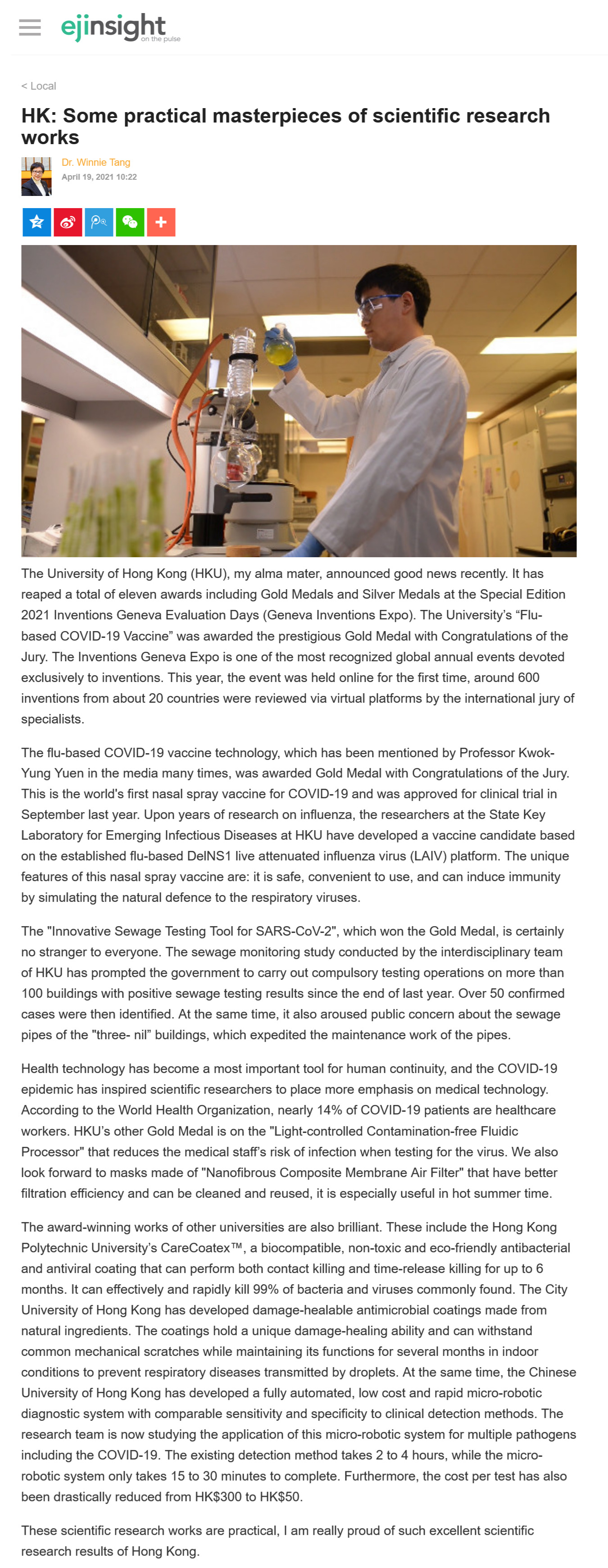網上版請按此

HK: Some practical masterpieces of scientific research works
The University of Hong Kong (HKU), my alma mater, announced good news recently. It has reaped a total of eleven awards including Gold Medals and Silver Medals at the Special Edition 2021 Inventions Geneva Evaluation Days (Geneva Inventions Expo). The University's "Flu-based COVID-19 Vaccine" was awarded the prestigious Gold Medal with Congratulations of the Jury. The Inventions Geneva Expo is one of the most recognized global annual events devoted exclusively to inventions. This year, the event was held online for the first time, around 600 inventions from about 20 countries were reviewed via virtual platforms by the international jury of specialists.
The flu-based COVID-19 vaccine technology, which has been mentioned by Professor Kwok-Yung Yuen in the media many times, was awarded Gold Medal with Congratulations of the Jury. This is the world's first nasal spray vaccine for COVID-19 and was approved for clinical trial in September last year. Upon years of research on influenza, the researchers at the State Key Laboratory for Emerging Infectious Diseases at HKU have developed a vaccine candidate based on the established flu-based DelNS1 live attenuated influenza virus (LAIV) platform. The unique features of this nasal spray vaccine are: it is safe, convenient to use, and can induce immunity by simulating the natural defence to the respiratory viruses.
The "Innovative Sewage Testing Tool for SARS-CoV-2", which won the Gold Medal, is certainly no stranger to everyone. The sewage monitoring study conducted by the interdisciplinary team of HKU has prompted the government to carry out compulsory testing operations on more than 100 buildings with positive sewage testing results since the end of last year. Over 50 confirmed cases were then identified. At the same time, it also aroused public concern about the sewage pipes of the "three- nil" buildings, which expedited the maintenance work of the pipes.
Health technology has become a most important tool for human continuity, and the COVID-19 epidemic has inspired scientific researchers to place more emphasis on medical technology. According to the World Health Organization, nearly 14% of COVID-19 patients are healthcare workers. HKU's other Gold Medal is on the "Light-controlled Contamination-free Fluidic Processor" that reduces the medical staff's risk of infection when testing for the virus. We also look forward to masks made of "Nanofibrous Composite Membrane Air Filter" that have better filtration efficiency and can be cleaned and reused, it is especially useful in hot summer time.
The award-winning works of other universities are also brilliant. These include the Hong Kong Polytechnic University's CareCoatex™, a biocompatible, non-toxic and eco-friendly antibacterial and antiviral coating that can perform both contact killing and time-release killing for up to 6 months. It can effectively and rapidly kill 99% of bacteria and viruses commonly found. The City University of Hong Kong has developed damage-healable antimicrobial coatings made from natural ingredients. The coatings hold a unique damage-healing ability and can withstand common mechanical scratches while maintaining its functions for several months in indoor conditions to prevent respiratory diseases transmitted by droplets. At the same time, the Chinese University of Hong Kong has developed a fully automated, low cost and rapid micro-robotic diagnostic system with comparable sensitivity and specificity to clinical detection methods. The research team is now studying the application of this micro-robotic system for multiple pathogens including the COVID-19. The existing detection method takes 2 to 4 hours, while the micro-robotic system only takes 15 to 30 minutes to complete. Furthermore, the cost per test has also been drastically reduced from HK$300 to HK$50.
These scientific research works are practical, I am really proud of such excellent scientific research results of Hong Kong.
Dr. Winnie Tang
Adjunct Professor, Department of Computer Science, Faculty of Engineering; Department of Geography, Faculty of Social Sciences; and Faculty of Architecture, The University of Hong Kong